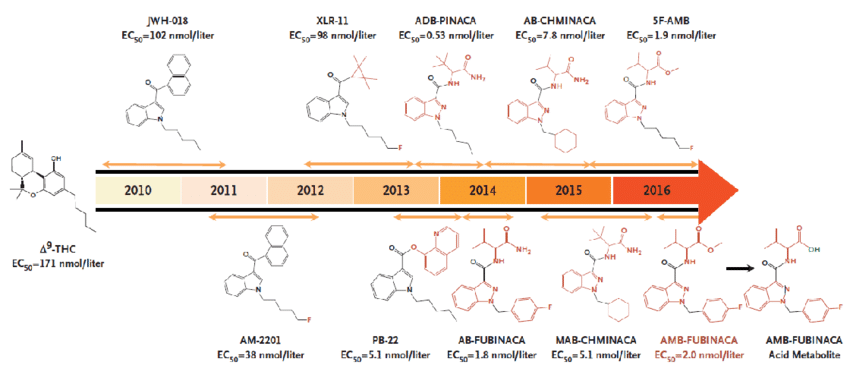The Evolution of Synthetic Cannabinoids
Synthetic cannabinoids have emerged as a significant area of interest within the field of chemical research, offering insights into the complexities of the endocannabinoid system and potential therapeutic applications. The evolution of these compounds reflects advances in chemical synthesis, pharmacology, and regulatory science.
Origins and Initial Development:
The development of synthetic cannabinoids began in the mid-20th century as scientists sought to understand the structure-activity relationships of naturally occurring cannabinoids like THC (tetrahydrocannabinol) and CBD (cannabidiol). Early research focused on modifying the structures of these compounds to enhance their potency and selectivity for cannabinoid receptors, CB1 and CB2, found throughout the body.
Pharmacological Exploration:
Synthetic cannabinoids have been instrumental in advancing our understanding of the endocannabinoid system, which plays a key role in regulating physiological processes such as pain, mood, appetite, and immune response. By creating analogs with varying affinities and activities at cannabinoid receptors, researchers have been able to dissect the mechanisms of action and potential therapeutic targets for conditions like chronic pain, epilepsy, and multiple sclerosis.
Diversity and Complexity:
As research progressed, the diversity and complexity of synthetic cannabinoids expanded significantly. Scientists have synthesized numerous classes of these compounds, each with unique chemical structures and pharmacological profiles. This diversity has provided valuable tools for studying receptor interactions and the broader implications of cannabinoid signaling.
Challenges and Concerns:
While synthetic cannabinoids have contributed greatly to scientific knowledge, their recreational use has raised significant public health concerns. These compounds can be substantially more potent than natural cannabinoids, leading to unpredictable physiological and psychological effects. This has prompted regulatory agencies worldwide to impose strict controls and bans on many synthetic cannabinoids.
Current Trends and Future Directions:
The evolution of synthetic cannabinoids continues as researchers focus on developing safer and more selective compounds with therapeutic potential. Advancements in computational chemistry and receptor modeling are aiding in the design of molecules with precise receptor targeting, minimizing adverse effects while maximizing therapeutic benefits.
In parallel, there is a growing interest in exploring non-psychoactive synthetic cannabinoids that offer therapeutic advantages without the intoxicating effects associated with THC. These efforts aim to harness the potential of cannabinoids in treating a wide range of medical conditions, from inflammation and neurodegenerative diseases to anxiety and cancer.
XPRESS CHEMS: Supporting Cannabinoid Research:
At XPRESS CHEMS, we provide researchers with access to high-quality synthetic cannabinoids, supporting innovative studies that delve into the complexities of cannabinoid pharmacology. Our commitment to rigorous testing and compliance ensures that our products meet the highest standards, empowering scientists to explore new frontiers in cannabinoid research.
As the field of synthetic cannabinoids continues to evolve, researchers are poised to unlock new therapeutic possibilities, contributing to a deeper understanding of human health and disease. For more information on our products and support, please contact our team.
 Europe
Europe


